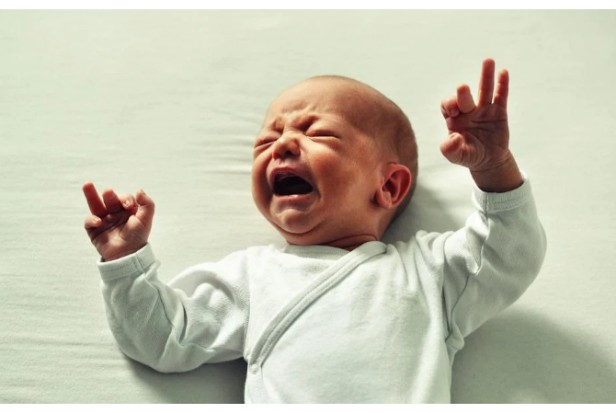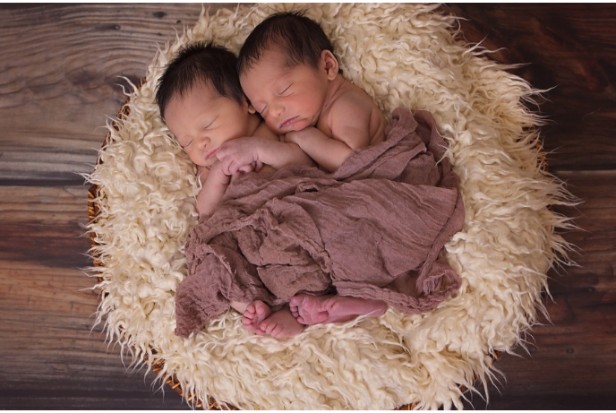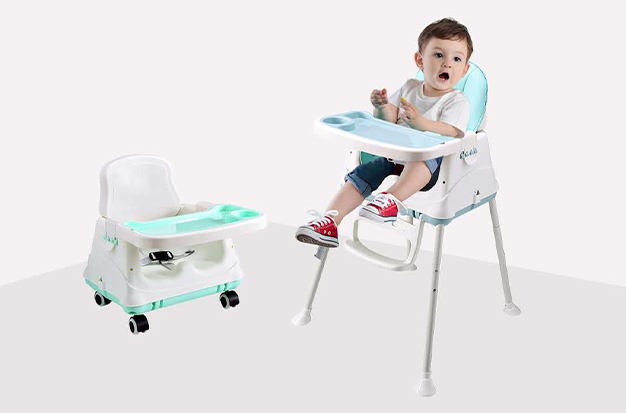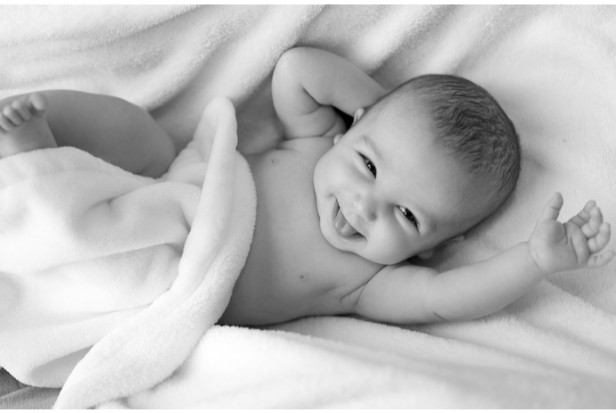It is particularly difficult to diagnose an ear infection in infants and toddlers because they lack the language abilities to communicate their feelings.
Your child’s sudden fascination with their ears could be caused by a number of factors. In fact, if your baby is touching his or her ears but shows no other symptoms, it’s probably nothing serious.
Here’s how to determine when it might be something more.
Causes Of Baby Ear Pulling Or Rubbing Their Ear
Your Baby Has Just Discovered They Have Ears
The ears on your baby’s head may have just come to their attention. Similar to when your baby first discovered that they could move their hands, this is similar to when they started accidentally smacking themselves.
Your baby may touch, pull, or play with their ears because they are something new to them and because their pincer grip is developing. This can develop into a passing habit. As soon as they focus on something else, like their toes, they’ll stop touching their ears.
Your Baby Is Self-soothing
Your child may be used to calming themselves by sucking on a pacifier, their hand, or their thumb. However, infants may also find other ways to calm themselves. In order to feel comfortable and unwind, your baby may be pulling, rubbing, or touching their ears.
You’ll probably see that your baby engages in ear play more frequently just before going to sleep or in the intervals between feedings if they are using it as a form of self-soothing. As your baby gets older, they won’t need to use this method of self-soothing and will stop on their own.
Pain In The Ear
Your infant or toddler’s tears or increased irritability may be signs of an ear infection because, in accordance with the American Academy of Pediatrics, they hurt. Additionally, since lying down puts pressure on the eustachian tubes, an ear infection may be the cause of your baby’s increased fussiness.
Your Baby Has Itchy Skin
When your baby pulls or rubs at their ears, they might simply be scratching an itch. Similar to adults, babies can experience dry skin for a variety of reasons. Some mild causes of dry, itchy skin disappear on their own.
Dryness can also affect the soft skin on your baby’s head and ears. Your baby might sometimes have slightly dry or itchy skin due to the following:
- Heating
- Ary air
- Air-conditioning
- Temperature changes
- Too much washing or bathing
- Some soaps or cleansers
- Laundry detergent
- Some types of clothing fabric
- Too much sweating
If your baby develops a severe rash, persistent dry, flaky skin, or any other type of rash, let your doctor know. Babies frequently develop eczema. Atopic dermatitis, the most prevalent form of eczema, affects approximately 65 percent of infants and kids before they turn one year old.
Eczema symptoms in babies include:
- dry, scaly skin patches
- redness
- skin swelling
- tiny skin bumps
- thick or hard skin patches
- crusting or pus on the skin
- sensitive skin
- irritability and crying
- difficulty sleeping or feeding
Your Baby Has An Ear Infection
Your baby may be pulling or touching their ears as a result of ear pain brought on by an infection. Between the ages of 3 months and 3 years, ear infections are most prevalent in infants and toddlers. Furthermore, they can be acquired multiple times by the poor little scum.
Due to the location of their ear tubes, babies and young children tend to develop ear infections more frequently. They have more vertical ear tubes than older kids and adults do. Baby’s horizontal ear tubes don’t drain fluid as well as their vertical ear tubes do.
If your usually happy baby is touching or scratching at their ears, look for other signs and symptoms of an earache, including:
- crying
- irritability
- not wanting to feed
- difficulty falling asleep or staying asleep
- fever
- vomiting
- runny nose
- allergy symptoms
- other cold or flu symptoms
- just got over a cold or flu
Difficulty Falling Or Staying Asleep
A sign of an ear infection is also having trouble falling asleep. This results from the discomfort caused by the ears’ increasing pressure. When things settle down at the end of the day or when it’s time to go to bed, active, busy kids will occasionally whine more about their pain. They frequently experience ear pain while sleeping, which causes them to wake up.

Your Baby Is Teething Or Has General Pain
An infant’s ear infection may appear very similar to teething pain. Because the nerves in the mouth and teeth extend all the way to the ears, this is the case. One distinction is that an ear infection frequently occurs concurrently with or immediately following your baby’s cold or the flu and may be accompanied by a fever.
Your baby may be pulling at its ears out of pure, unadulterated annoyance. Your infant might irritably grab at their ears if they are congested or have diaper rash. When this happens your little one will also show other signs of being in pain, like:
- Crying
- Screaming
- Turning red
- Skin rash
- More drooling than normal
- Putting their hands or toys in their mouth
- Touching their mouth
- Runny nose
- Fever
- Skin rash
Fluid Or Pus Draining From Your Child’s Ear
Even though it’s uncommon, this is unmistakably an infection, so get in touch with a doctor right away. A perforated eardrum, which can happen if fluid in the middle ear exerts enough pressure on the eardrum to cause it to burst, can cause yellow, white, or green drainage from the ear.
Although a burst eardrum may sound frightening and can be extremely painful for your child, the hole is not serious and will typically close on its own. The good news is that your child might begin to feel better as the fluid drains and the pressure goes down.
Treatment For Baby Ear Pulling
Depending on why your child is pulling at his or her ears, you should respond accordingly. You might occasionally require medical care to help ease the cause.
If your little one is grabbing or pulling at their ears just because, or scratching their ears so badly that their skin becomes raw or even bleeds, try to help deter the ear obsession. To prevent your baby’s fingers from wandering, put on some small mittens or a fresh pair of socks.
Giving your baby something else to do with their hands, like playing with something loud and colorful, can also serve as a distraction. Giving your baby new textures to feel, such as a rubbery toy, is also beneficial for their development and may even help them temporarily forget about their ears.
Use a cold pacifier to ease teething discomfort. Ask your baby’s pediatrician if any baby pain relievers are suggested as an alternative. Consult your pediatrician if your infant is pulling their ears, has recently had the flu or a cold, or exhibits any other symptoms.
Bacterial or viral infections can lead to baby ear infections. They can harm hearing if left untreated. An ear infection in your baby might require a course of antibiotics or other treatment.
In a similar vein, some babies may experience serious skin rashes like eczema. Despite the fact that there is no cure, your doctor can provide your baby with the best care to minimize symptoms.
Although it’s not uncommon for it to last for several months, baby dandruff or cradle cap typically goes away on its own. Washing your baby’s scalp with warm water and a baby shampoo every couple of days can help to loosen scaly patches.
When To See Your Pediatrician
It’s best to consult your pediatrician if something doesn’t seem quite right with a baby’s ears (or any other part of their body, for that matter).
Only by visiting your pediatrician can you be certain that your child has an ear infection. If a cold or other visible discomfort doesn’t go away in two to three days, or if a fever doesn’t go down in one to two days, take a child under the age of two to the doctor. (If your child has a fever, call your doctor right away if they are under 4 months old.)
When your doctor looks inside your child’s ear to look for indications of an infection, they are checking the eardrum to see if it is red, thick, or swollen. If so, they might advise waiting it out to see if it goes away on its own, depending on the infection’s severity and other factors. Or they may advise taking medication, usually antibiotics, to hasten the healing process.
Additionally, the pediatrician of your child can advise whether ear drops or over-the-counter painkillers like acetaminophen or ibuprofen would be beneficial for your child. Ear pain can be relieved by sitting up while sleeping and being slightly propped up (this is only safe for older children; babies must sleep flat on their backs to reduce the risk of SIDS). Sitting in a warm, steamy bathroom can also be helpful.
The Takeaway
Baby ear pulling, scratching, or grabbing might be another adorable behavior your baby demonstrates. They’ll probably stop doing it on their own because it’s completely normal. (The dreaded mittens or hand-socks may need to be worn once more if they play around with their ears too much.)
However, if your baby also exhibits other symptoms like ear pulling or scratching, it could be a sign that they are uncomfortable, agitated, or otherwise ill. Babies may experience serious health issues with their ears, scalps, and skin. Visit your pediatrician as soon as possible for a checkup.



